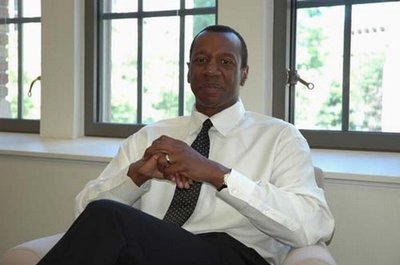July 6, 2006
Meet the vice provosts: Tutoring started Taylor on life in education
Ed Taylor was a talented high school basketball player with no firm plan for his future when he met the people who would unknowingly steer his life toward teaching. Not surprisingly, they were students.
An associate professor in Educational Leadership and Policy Studies, Taylor has been named vice provost and dean for undergraduate academic affairs, a position formerly called the dean for undergraduate education. He recalled a few memories when asked about his life and career as he starts this challenging new job.
Taylor said when he arrived at Lompoc High School in Santa Barbara County, Calif. — a boy from a “very modest” single-parent home — he met two key personalities: the coach who let him straight onto the varsity team, and the school principal, who got him involved in a grant-funded program reading to children in a preschool for low-income families.
The irony was not lost on him, he said, but he enjoyed the work even though the funding disappeared quickly.
“We’d sit together and I’d read, or play or facilitate nap time, pretty much every day,” he said. “It was a mile and a half away, and I seldom missed a day, even when the checks stopped coming.”
Through this experience, he said, he began to think of pursuing either teaching or child psychology. “And even after I first went to college, I would come back during the summer and visit the kids who were now 9, 10, 11. They still remembered me.”
Clearly, the experience stuck with him, too. That’s when, he said, “I made a deep commitment to issues of access, and poverty.”
Taylor subsequently earned his bachelor’s degree in sociology and his master’s in psychology from Gonzaga University, then came to the UW, where he earned a doctorate in Educational Leadership and Policy Studies in 1994.
“Part of what I had a chance to do, when I started at the UW,” he said, “was sit in the back of classrooms of people I’d heard were remarkable. I’d watch good teaching — and in part I was trying to learn to be a good teacher myself.”
He did post-doctoral work with Fred Campbell, former sociology professor and dean of undergraduate education, calling it “a really powerful and remarkable experience.” He spoke highly, too, of George Bridges, who followed Campbell in the deanship, and of Interim Dean Christine Ingebritsen, who he said has done “fabulous work,” including her promotion of a common book for the UW campus.
Taylor’s appointment as vice provost and dean of undergraduate academic affairs was announced in June, simultaneously with Eric Godfrey’s promotion to vice provost for student life. Both began their new positions on July 1.
“Right now there’s a window of opportunity on campus with Eric Godfrey’s appointment and mine, and the president still early in his tenure at the University,” Taylor said, “to really think and continue in new and innovative ways.” He said it would be good to create new opportunities for students to be involved in research, “because that’s who we are. The unit should not move far from what which we do best — we are one of the nation’s top research universities.”
He added, “Which is not to say we don’t also expect great teaching along the way.” In this way, he said, when students think of the UW, “they’ll think of those two things hand in hand.”
In recent years, Taylor’s name in the College of Education has been synonymous with his work with the evolving school systems in South Africa, where he was first brought by the late Comparative History of Ideas Professor Jim Clowes. “Jim had this way of inviting you and enticing you to places without a real plan laid out. And I had never been out of the country, other than Canada,” he said, remembering his colleague fondly.
He said simply that that trip “changed my life.”
South Africa at the time was just a few years free of its long, dark era of apartheid. Taylor called the efforts he saw to create a multiracial democracy in South Africa “pure, honest and fragile.” In an interview posted on the College of Education Web site, he said of the South African school, “They’re on the precipice of something very important in their communities and their schools, and the schools will be an engine for major societal change.” He called the educators there “true freedom fighters, and remarkable people.”
Taylor remains involved with South Africa through Molo Care, a nonprofit organization he helped found that he said continues to support a dozen schools in South Africa. Readers may remember when Pearl Jam’s Eddie Vedder, a supporter of the nonprofit, teamed up to make music with the Walmer High School Choir from Port Elizabeth. Molo Care provides needed scholarship money to families and offers professional development for school principals, among many other services. (Learn more at http://www.molocare.org/.)
And though Taylor has had his share of academic mentors and teachers, experiences and journeys, he continues to be thankful for the support of family members such as his mother, Mildred Taylor, his sisters Linda Price and Edna Prince, and brother Glenn Taylor.
“They have all been inspiring in their respective ways, and my mother in particular,” Taylor said. “Her strength and wisdom have guided me to this point, and still do.”



